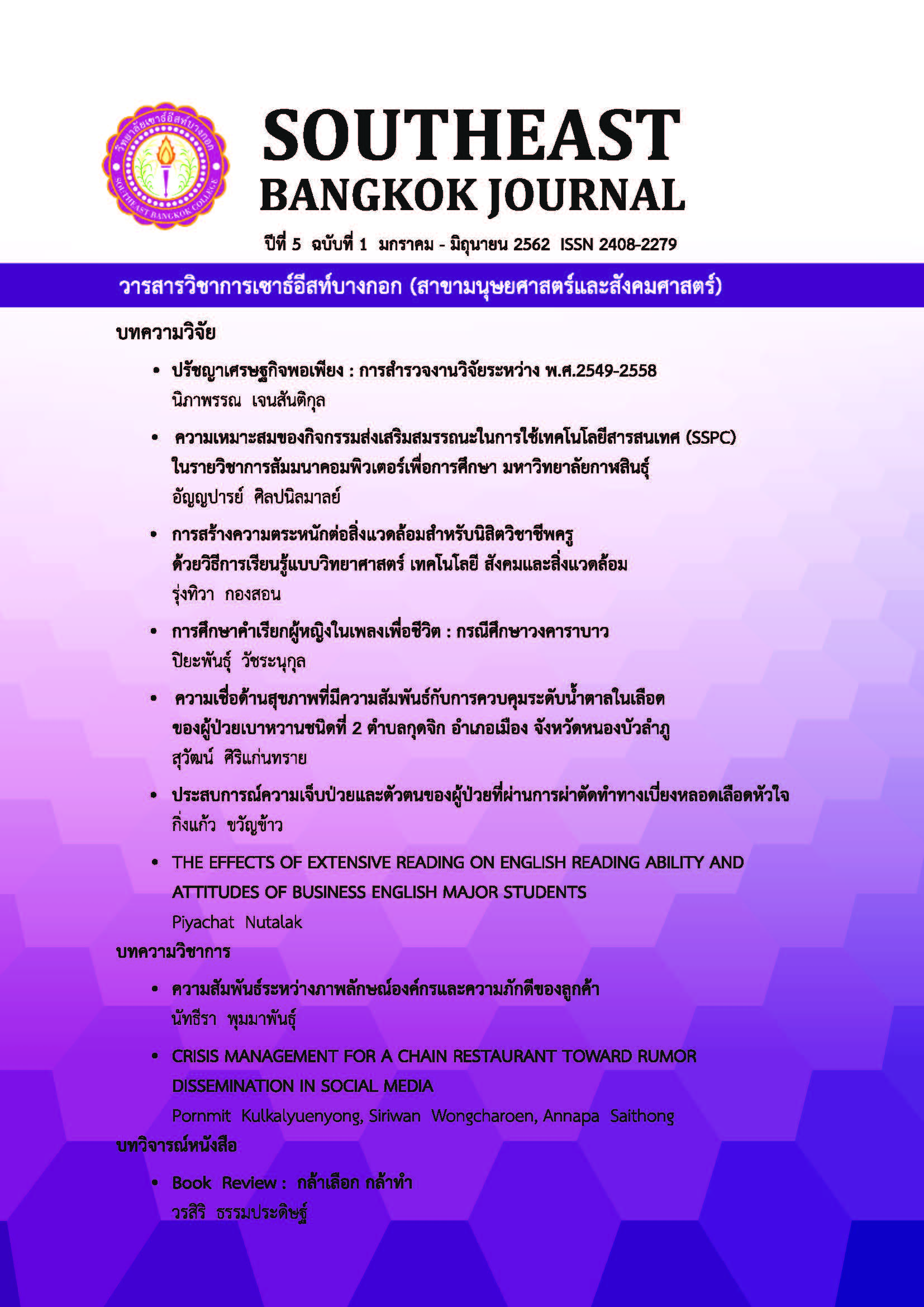การสร้างความตระหนักต่อสิ่งแวดล้อมสำหรับนิสิตวิชาชีพครู ด้วยวิธีการเรียนรู้ แบบวิทยาศาสตร์ เทคโนโลยี สังคมและสิ่งแวดล้อม
Main Article Content
บทคัดย่อ
การวิจัยมีวัตถุประสงค์เพื่อ 1) ศึกษาระดับความตระหนักต่อสิ่งแวดล้อมสำหรับนิสิตวิชาชีพครู ด้วยวิธีการเรียนรู้แบบวิทยาศาสตร์ เทคโนโลยี สังคมและสิ่งแวดล้อม 2) เปรียบเทียบระดับความตระหนักต่อสิ่งแวดล้อมสำหรับนิสิตวิชาชีพครูก่อนและหลังการเรียนรู้ด้วยวิธีการเรียนรู้แบบวิทยาศาสตร์ เทคโนโลยี สังคมและสิ่งแวดล้อม เครื่องมือที่ใช้ในการวิจัยเป็นแบบวัดความตระหนักต่อสิ่งแวดล้อมและแบบประเมินความตระหนักต่อสิ่งแวดล้อม ดำเนินการตามแผนการจัดเรียนรู้ตามแบบแผนการวิจัยกลุ่มเดียวทดสอบ ก่อน-หลังเรียน วิเคราะห์ข้อมูลโดยการหาค่าเฉลี่ย ส่วนเบี่ยงเบนมาตรฐาน ร้อยละ และการทดสอบค่าที (t-test) พบว่า 1) นิสิตวิชาชีพครูที่ได้รับการจัดการเรียนรู้แบบวิทยาศาสตร์ เทคโนโลยี สังคมและสิ่งแวดล้อมมีความตระหนักต่อสิ่งแวดล้อมหลังเรียนสูงกว่าก่อนเรียนอย่างมีนัยสำคัญทางสถิติ ที่ระดับ .05 ความตระหนักต่อสิ่งแวดล้อมก่อนเรียนอยู่ในระดับมากหลังเรียนอยู่ในระดับมากที่สุด 2) นิสิตวิชาชีพครูที่ได้รับการจัดการเรียนรู้แบบวิทยาศาสตร์ เทคโนโลยี สังคมและสิ่งแวดล้อมมีความตระหนักต่อสิ่งแวดล้อมคิดเป็นร้อยละ 87.89 ระดับคะแนนคุณภาพระดับมาก
Article Details
เอกสารอ้างอิง
กมลวรรณ กันยาประสิทธิ์.(2558). ประเด็นทางวิทยาศาสตร์กับสังคมเพื่อทักษะในศตวรรษที่ 21. วารสารศึกษาศาสตร์, (26)2, 6-7.
กิตติภูมิ มีประดิษฐ์. (2559). สร้างความตระหนักในสิ่งแวดล้อมเพื่อหยุดมรดกแห่งมลพิษ. สืบค้นเมื่อ 2 พฤศจิกายน 2560, จาก https://www.bangkokbiznews.com/blog/detail/637550
บุญชม ศรีสะอาด. (2545). การวิจัยเบื้องต้น ฉบับปรับปรุงใหม่ (พิมพ์ครั้งที่ 7). กรุงเทพฯ: สุวีริยสาส์น.
เพชรรัตน์ ศรีสวัสดิ์. (2554). จิตอนุรักษ์ต่อสิ่งแวดล้อมของนักเรียนชั้นประถมศึกษาปีที่ 6. วิทยานิพนธ์ปริญญามหาบัณฑิต, มหาวิทยาลัยเกษตรศาสตร์.
รุ่งทิวา กองสอน และพงษ์ศักดิ์ แป้นแก้ว. (2556). การพัฒนาการจัดกิจกรรมการเรียนรู้วิชาเคมี ตามแนวคิดวิทยาศาสตร์ เทคโนโลยี สังคมและสิ่งแวดล้อม เพื่อส่งเสริมทักษะการคิดแก้ปัญหาของนักเรียน. วารสารวิชาการ Veridian E-Journal, 6(2), 50-64.
ศักดิ์ศรี สุภาษร.(2552). การออกแบบการวิจัยทางวิทยาศาสตร์ศึกษา. อุบลราชธานี: เครือข่ายพัฒนานวัตกรรมการเรียนรู้ คณะวิทยาศาสตร์ มหาวิทยาลัยอุบลราชธานี. อุบลราชธานี
ศรัณย์ อัมระนันท์ และคณะ. (2558). ผลของการจัดการเรียนรู้แบบสืบเสาะหาความรู้โดยเน้นการใช้คำถามระดับสูงเรื่อง พันธะโคเวเลนต์ ที่มีต่อผลสัมฤทธิ์ทางการเรียนและการให้เหตุผลทางวิทยาศาสตร์สำหรับนักเรียนชั้นมัธยมศึกษาปีที่ 4 .วารสารศึกษาศาสตร์, (26)2, 76-78.
สุวิชชา รักษศรี. (2558). การพัฒนาความตระหนักทางสิ่งแวดล้อมผ่านกิจกรรมนันทนาการ สำหรับนักเรียนชั้นประถมศึกษาปีที่ 5. Veridian E-Journal, Silpakorn University, 8(1), 1231-1242.
สํานักงานคณะกรรมการพัฒนาการเศรษฐกิจและสังคมแห่งชาติ. (2560). สรุปสาระสาคัญแผนพัฒนาเศรษฐกิจและสังคมแห่งชาติ ฉบับที่สิบสอง พ.ศ. 2560 – 2564. สืบค้นเมื่อ 4 กันยายน 2561, จากhttps://www.nesdb.go.th/ewt_news.php?nid=6420
สำนักนายกรัฐมนตรี. (2560). แผนพัฒนาเศรษฐกิจและสังคมแห่งชาติฉบับที่สิบสอง พ.ศ.2560 – 2564. สืบค้นเมื่อ 4 กันยายน 2561, จาก https://www.nesdb.go.th/ewt_dl_link.php?nid=6422
สุริยาวดี นึกรักษ์ และคณะ.(2559).การพัฒนาการรู้เรื่องวิทยาศาสตร์ของนักเรียนระดับชั้นมัธยมศึกษาปีที่ 6 โดยการจัดการเรียนรู้ตามแนวคิดวิทยาศาสตร์ เทคโนโลยี สังคมและสิ่งแวดล้อม (STSE)เรื่อง สารประกอบไฮโดรคาร์บอน. Veridian E-Journal, Silpakorn University.(9)2, 1329-1331
Aikenhead, G.S. (1994). What is STS science teaching?. New York: Teacher’s College Press.
Aikenhead, Glen S. (1988). Teaching Science through a Science-Technology-Society-Environment Approach: An Instruction Guide.Saskatchewan: Open University Press.
Bencze, J. L. (2011). STSE Education. สืบค้นเมื่อ 2 พฤศจิกายน 2560, จาก https://webspace.oise.utoronto.ca/~benczela /STSEEd.html
Erminia G., Larry, B., Jim, H., Lisa, R. and Ashifa, J.,“Promoting Issues-based STSE Perspectives in Science Teacher Education: Problems of Identity and Ideology,” Proceedings, Science& Education, 17, 2008,pp. 941-960.
Fraenkel and Wallen. How to Design and Evaluate Research in Education. McGraw-Hill Higher Education.University Hal.l Boston: McGraw-Hill, 2006.
Kim, M., and Roth, W-M.,Rethinking the ethics of scientific knowledge: a case study of teaching the environment in science classrooms. Asia Pacific Education Review, 9(4), 516-528, 2008.
Pedretti, E. (2005). STSE education: principles and practices. in Aslop S., Bencze L., Pedretti E. (eds.) Analysing Exemplary Science Teaching: theoretical lenses and a spectrum of possibilities for practice Maidenhead. Open University Press.
Poonam Sindhu, P & Suman, S. (2014). A Study of Awareness towards Environmental Education among the Students at Secondary Level in Gurgaon District. International Journal of Scientific and Research Publications, 4(1),1-4. Retrieved from www.ijsrp.org
Solomon, J. (1993). Teaching Science, Technology and Society. Buckingham Philadelphia: Open University Press.
Solomon, J. & Aikenhead, G. (eds.). (1994). STS Education: International Perspectives in Reform. New York: Teacher’s College Press.


